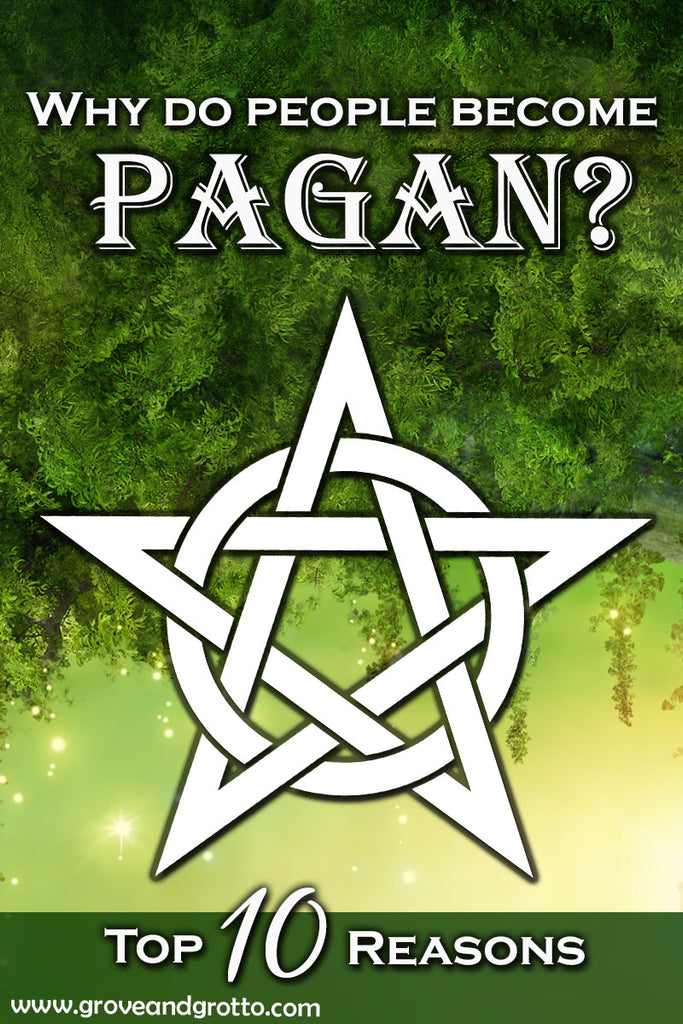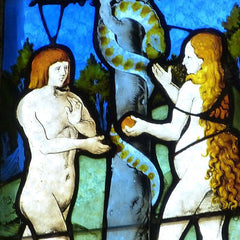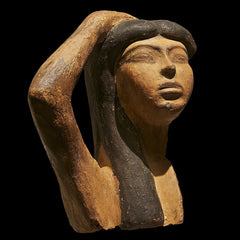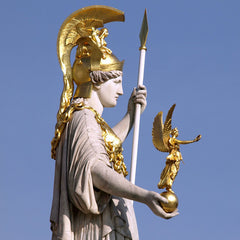
“Why are you Pagan?” If you were to ask this question of a dozen people, you would probably get a dozen different answers. For Christians (and others who believe in one true God) the revival of polytheism may be confounding. For others, it is hard to understand why a sensible modern person would seem to turn their back on science to worship the gods of old.
Before we get too far along, let's cover some background info. Paganism is defined broadly as non-Abrahamic religion that is Nature-based, polytheistic, or both. Wiccans, for instance, generally worship a creator Goddess and a God who is Her consort. The Wiccan cosmology does not acknowledge the existence of the Christian God (or the concepts of Satan and Hell).
Wicca is the best-known of modern Pagan religions, but there are many sub-groups and branches of Pagan belief and practice. Druidism, neo-Shamanism, Greek/Roman reconstructionism, and Norse Heathenry are just a few. There are also eclectic Pagans who combine elements from various traditions to make their own “flavor” of Paganism. While occult practices (e.g., divination and spellcasting) are common in Paganism, not all Pagans participate in these practices. Conversely, not everyone who is involved in the occult is a Pagan.
Most Pagans are polytheist, meaning they recognize the existence of more than one God. But there is more to Paganism than “the more, the merrier!” Here are some general traits of Pagan religions (keep in mind that not every religion will have them all): Rejection of Judeo-Christian cosmology, observance of seasonal rites, reverence toward Nature, rejection of religious authority and focus on individual experiences, paranormal/psychic beliefs and practices, emphasis on personal responsibility over sin or evil.
Not surprisingly, a preference for one or more of these traits is what attracts many people to Pagan religions—but we’ll get to that in a moment.
At the risk of stating the obvious, religion is a choice. If a person follows a Pagan religion, they are expressing a preference for Paganism over another religion, or no religion. Thinking about the reasons why people choose to become Pagan can lead to better understanding of Pagan friends and family. If you are Pagan, you may even learn something about yourself!
For the record, I’m Pagan in a mixed-religion household. This (totally unscientific) list is based on my own observations within the Pagan community. I’ve tried to present them in a way that’s inclusive and fair. Without further ado, here are some of the most common reasons why people choose to follow a Pagan religion:
1. They were raised Pagan.

Contemporary Pagan groups began forming in the 1930s, and achieved breakthrough status with the emergence of Wicca in the 1950s. Before that time, very few people in the West were raised Pagan. If you wanted to be initiated in a Pagan tradition, you had to seek one out—often at great expense to your personal or professional reputation.
Nowadays, that’s not the case. Neo-Paganism as a social/demographic phenomenon is in its third generation. It’s fairly common to find adults who were raised Pagan, or even whose parents were raised Pagan! It’s also possible to find those who were raised Pagan, but left Paganism. “Mom used to go out in the woods with her friends and do weird stuff—I never really got into it.”)
Some Pagan clergy will participate in the general blessing of infants and children, such as the ritual of “Wiccaning.” However, most Pagan paths do not have formal initiation for children. Pagans also overwhelmingly value religious choice. If someone continues their Pagan practice into adulthood, it is likely because they found something meaningful in it.
2. They want sexual acceptance and/or sexual freedom.

Of all the world religions, Paganism is arguably the most tolerant of the varied expression of human sexuality. Sex is considered a divine gift and a sacred rite. Lusty Gods and fertile Goddesses appear in all the major pantheons. (Along with gender-bending, raunchy stories, and other sexy fun.) For most Pagans, sex is just no big deal as long as it’s between consenting adults (or deities).
Pagan groups almost universally accept gay members, and some traditions even have queer or queer-leaning branches (Radical Faeries, Dianic Wicca). Pagan activists have been on the forefront of the struggle for equal rights. Compare that to the sluggish response of churches—even liberal churches—to embrace LGBTQ members and clergy, and you’ll understand why sexual minorities have been so attracted to Paganism. For people who are used to hearing their sexual desires called dirty, sinful, or shameful, the difference can be life-changing.
It’s not just queer folks who embrace Paganism as a safe haven. Horny folks do, too. In most Pagan belief systems, sex is not considered a sin but a morally neutral act. Sex for fun is fun, sex for magick is magick. It’s not how much sex you’re having, but your intention that characterizes the act. The only moral imperative is in how you’re treating yourself and your partners.
Partners? Oh, yes! Polyamory, group sex, and (legal) exhibitionism are accepted within some Pagan communities. That’s an undeniable treat for people who want to enjoy these activities without religious shame.
3. They don’t care for dogma and/or authority.

There is no holy book, no central governing body, and no real priestly authority within the mass of related beliefs filed under Paganism. This is great news for people of a certain temperament—religious rebels and militant agnostics. (“I don’t know, and you don’t either!”)
As a social movement, neo-Paganism is deeply indebted to the Transcendentalist writers of the 19th century. Their poems and essays held the germ of the idea that fuels Pagan practice: That God speaks directly to everyone—often through Nature—and not only to a specially qualified few, inside special buildings.
Some Pagan groups do have ordained clergy. But there are still significant differences between Pagan clergy and those of more established organized religions:
First, Pagan titles like “High Priestess” are usually self-conferred or passed along from student to teacher. This does not mean that they’re not “real” clergy, but it does mean that their power is limited outside their own group or coven. (A Pagan leader may also be ordained as a minister by another organization, such as the Church of All Worlds or the Unitarian Universalist church. This allows them to receive certain legal privileges that independent Pagan clergy usually do not enjoy.)
Secondly, Pagan clergy tend to function more as community leaders than authority figures. Pagan priesthood does not confer any real power over others, either temporal or spiritual. Most Pagan leaders encourage discussion and self-study by their students and congregants. Certainly a dedicated Priest or Priestess will have more experience working with their deities than a beginner. They may have the skills to do rituals or advanced deity work that a novice does not. In a sense, though, every Pagan is their own Priest or Priestess—and the best Pagan clergy respect that. This makes Paganism very attractive to those who don’t want to experience God(s) secondhand.
4. They long for a connection to Nature.

The earth, the trees, the sky, the sea—most world religions recognize these wonders as the work of a mighty creator God. And yet, most leave it at that.
Not so with Paganism. Pagan religions are sometimes described as “Earth-based”—meaning the Earth and its cycles are central to what Pagans hold sacred. Most Pagans profess a deep reverence for natural places, the seasons, the web of plants and animals, and the processes of birth, aging, and dying. While it’s not technically required, many Pagan services are held outdoors. “Skyclad” (nude) rites are another way that Pagans shed the trappings of modern society and get back to the core of being.
Some people come to Paganism as an extension of their environmentalist or eco-feminist views. Others simply want to reconnect with Nature as an antidote to the alienation that comes with busy, digitized lives.
5. They’ve had negative experiences with other religions.

It’s a sad but undeniable fact. People who turn toward one religion are often, with the same movement, turning away from a religion that has hurt them. If you spend enough time in Pagan communities, you will certainly meet some of these displaced folks.
Perhaps a certain religious doctrine—such as the prohibition against homosexuality—is causing the person emotional pain. Maybe they’re frustrated with persecution, corruption, or hypocrisy within the religious group they came from. Or maybe they’re rebelling against the religious beliefs of a parent or spouse. Whatever the case, Paganism appears to offer a chance for a fresh start, one with less restriction and oversight than they may be used to. Pagans don’t evangelize—which may make them seem more trustworthy to folks who have been burned.
As with all life choices, there are right and wrong reasons to become a Pagan. And you can’t ever really know someone else’s motives. The best thing that Pagans can do is treat religious refugees kindly, answer their questions honestly, and wait for them to figure out if Paganism is right for them.
6. They have trouble with the concepts of sin and evil.

Of all the barriers between Pagan beliefs and Abrahamic religion, the idea of sin is the thorniest. Original sin is a tough doctrine to swallow, even for many Christians. Who wants to suffer for something that happened before they were born? That Paganism has no equivalent concept to sin and sinfulness is one of its biggest selling points, so to speak. (Pagan beliefs about the origin/existence of evil are so diverse I won’t even try to tackle the topic here.)
As mentioned earlier, there’s no single Pagan concept of God. Still, one idea you see over and over in Paganism is the doctrine of non-dual immanence. God/Goddess existing here and now, and not in some distant place or kingdom to come. Lack of meditation or participation or acceptance can distance us from the sacred, but God/Goddess is always there. Furthermore, divinity is present within the material world, and the world is inseparable from its creator.
All of this is pretty difficult to reconcile with Judeo-Christian ideas about original sin and the fall of man. (Some Hermetic Pagans do accept them as metaphorical/alchemical truths—but that’s a whole other beaker of worms.) In Biblical cosmology, the world is created by God, but separate from God. The world we know is basically fallen and can only be redeemed through God’s intervention. In Paganism, the world we know is basically holy and does not require redemption. (Only observation and celebration, if we want to be happy and—perhaps—please the Gods.) The other worlds are holy, too—not more, nor less.
As for behavior? Paganism emphasizes individual freedom and responsibility over moral absolutism. Most Pagans live by an individual moral/ethical code, but shun universal behavioral codes. Pagan ethics have been heavily influenced by the Wiccan Rede: “An it harm none, do what ye will.” This in turn derives from Aleister Crowley’s “Do what thou wilt shall be the whole of the Law”—possibly the most mis-interpreted eleven words of all time.
It’s not that Pagans believe that you can or should do whatever you want. On the contrary, Paganism teaches that actions (and even thoughts) reverberate through the universe to affect oneself and others. There’s no real concept of sin, but Paganism is not amoral. In encouraging moral behavior, Paganism substitutes concepts like karma, duty, interconnectedness, for a paternal god figure keeping score.
7. They yearn for representations of the Divine Feminine.

Dion Fortune wrote “A religion without a Goddess is halfway to atheism.” Women’s bodies are the carriers of life. And yet, many world religions downplay or denigrate the contribution of women. In Abrahamic religions, women can be vessels and saints, but are rarely prophets and never God. Many people yearn for distant time—real or imagined—when women’s bodies could also be a representation of deity.
As a social phenomenon, the rise of Wicca and Goddess spirituality has coincided pretty neatly with the expansion of women’s rights. As long as women are to be regarded as equal to men in society, there are those who feel that patriarchal religions can never be wholly legitimate.
Everyone has an earthly mother and a father. If you believe in God, it makes a kind of intuitive sense that everyone has a divine Mother and Father, too. Yet religions that include a Goddess are usually labeled polytheist and Pagan automatically.
8. They want explanations for psychic and paranormal events.

Out-of-body experiences, premonitions, telepathy, ghost encounters—weird stuff sometimes happens. If you haven’t had an inexplicable experience, then you likely know someone who has. Pagans aren’t alone in experiencing the paranormal, of course. But they tend to be better equipped to talk about it than the average person.
Imagine a person who has recurring paranormal experiences, or experiences they believe to be paranormal. Mainstream science tells them that these experiences are illusory. Mainstream religion—when it’s not condemning them as evil—seems mostly too embarrassed to talk about occult happenings. It’s no surprise that the person would be drawn to a Pagan community where psychic stuff is openly discussed, accepted, and even encouraged.
Don’t get me wrong—mental illness and paranormal delusions do occur, and can cause great harm. But the not-crazy among us still yearn for a safe haven to discuss our psychic lives without condemnation. I believe—though I can’t prove—that so-called paranormal experiences are actually quite common among the general population. I’ve also observed that persistent psychic curiosity is one of the major reasons that people turn to Paganism.
9. They’re attracted to the power and control offered by magick.

I once read an academic paper that was trying to explain the rise of Wicca and witchcraft among teenage girls. The conclusion was that when a young women lacks a sense of control in her life—i.e., economic, sexual, or social autonomy—a religion that offers a secret source of power is immensely attractive. (Who wouldn’t want to be able to cast a love spell on a crush, or curse a bully?) The author observed that many teen girls become practicing Pagans in junior high and high school. They tend to lose interest after finding another source of personal power (a job, a relationship, a better group of friends).
As a young Pagan woman, I found the tone of this particular paper to be condescending, bordering on insulting. But one thing is obviously true: Occultism purports to offer power to the powerless, esoteric means to an end when exoteric means have come up short. Why else would there be so many people interested in fast answers—love spells, get-rich-quick spells, and the like?
Lots of people approach witchcraft and/or Paganism because they want to learn to use magick. They see it as a way to fix their lives in a hurry or achieve undeserved success. Many of them move along when they realize that real magick is real work.
10. They’ve been called by a God or Goddess.

A burning bush, a deathbed vision of Christ, a miracle from the Virgin Mary—these are the types of religious experiences that are familiar to most people. But Pagans have religious epiphanies, too. Although most of us don’t talk about it outside of trusted circles, our Gods and Goddesses call to us in dramatic and in subtle ways.
Like any other type of religious conversion, some people drift gradually toward an acceptance of Paganism, while others are thrust toward it by a single epiphany. Some people may scoff at the idea of elder Gods asserting their presence in the 21st century. But it's certainly no wackier than what other religious people believe. (And it's hard to be so cavalier when Odin’s keeping you awake at night with a to-do list.)
For most Pagans, one or more of the above reasons has contributed to their finding their religious path. There are certainly other reasons that aren’t on this list. Of course, the best way to find out why a particular person is Pagan is to (respectfully) ask!
Enjoy this article? Please share with friends, or check out the archive.
